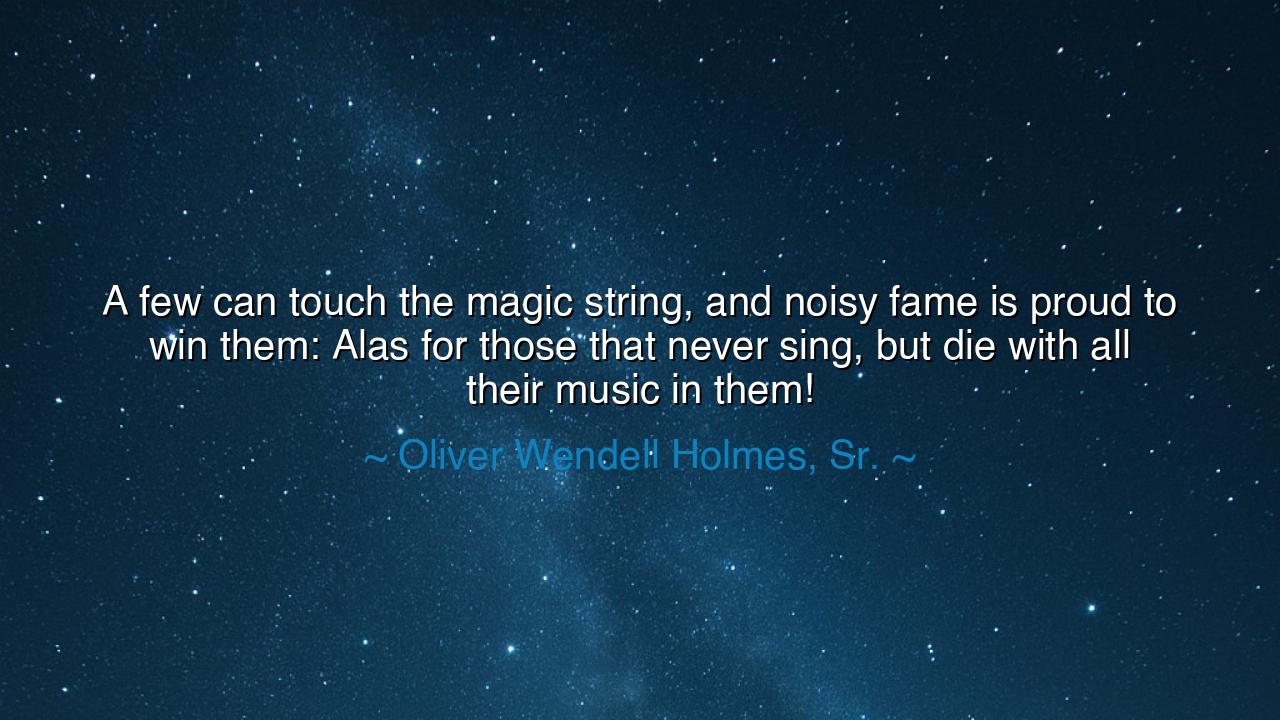
A few can touch the magic string, and noisy fame is proud to win
A few can touch the magic string, and noisy fame is proud to win them: Alas for those that never sing, but die with all their music in them!






“A few can touch the magic string, and noisy fame is proud to win them: Alas for those that never sing, but die with all their music in them!” So wrote Oliver Wendell Holmes, Sr., physician, poet, and sage of the nineteenth century. His words are at once triumphant and mournful, for they speak of two destinies that await mankind: the destiny of those who awaken their gifts and share them with the world, and the destiny of those who bury their talents, silencing the song within until death carries it away unheard. The passage is both a hymn of praise to the inspired and a lament for the forgotten multitude.
The origin of this verse lies in Holmes’s meditation upon human potential. He saw that in every soul there lies a music—a gift, a fire, a calling—that cries out for expression. For some, it is the gift of song or art; for others, the gift of invention, wisdom, or compassion. To “touch the magic string” is to discover this hidden power and to strike it with courage, so that its sound resounds across the world. Yet Holmes knew that only a few ever find this courage. Many live and die with their treasures unspent, their melodies unplayed, their greatness unfulfilled. Thus he warns us, with sorrow: “Alas for those that never sing…”
History is filled with shining examples of those who dared to touch the magic string. Consider the life of Ludwig van Beethoven, who, though struck deaf in the prime of his life, refused to let silence extinguish the music within him. Unable to hear even a single note with his ears, he composed symphonies that shook the earth and lifted the heavens, works of such power that they are still revered centuries later. Fame indeed crowned him, but it was not noisy applause that mattered most—it was the triumph of a man who refused to let his inner song be buried with him. His life embodies Holmes’s truth: blessed is he who does not die with his music still locked inside.
Yet opposite examples abound. How many have lived ordinary lives, their gifts unnoticed, their passions stifled by fear or neglect? How many painters never lifted the brush, how many poets never set pen to page, how many leaders never raised their voices for justice? Their music lies entombed within them, a silent tragedy that no historian records, but that eternity remembers. This is the sorrow that Holmes laments—the wasted chorus of humanity, silenced before it was ever heard.
The teaching is thus clear: each man and woman carries within them a song. It may not be the song of worldly fame, nor need it be the roar of thunder that shakes nations. Yet it is a song that belongs to them alone, a gift entrusted by the divine to their soul. To suppress it is to deny both self and Creator; to express it is to fulfill one’s portion of destiny. Even if the world never crowns you with fame, to sing your song is itself victory.
Therefore, let the seeker of wisdom take this path: search within, and listen. What is the music that stirs in your heart? What desire, what vision, what art, what labor would bring your soul to life if you dared to follow it? Begin there. Do not wait for perfect circumstances. Begin where you are, with what you have, in whatever measure you can. Write a line, play a note, speak a truth, help a neighbor. By these acts you set your music free, and in setting it free, you live fully.
So let Holmes’s words burn in your memory: “Alas for those that never sing, but die with all their music in them!” Take heed, for silence is not innocence—it is waste. Do not go to your grave carrying unspoken songs, unpainted visions, unlived dreams. Live so that, when the end comes, the world will say: “This one touched the magic string, and though their fame may be great or small, their music lives on.”






AAdministratorAdministrator
Welcome, honored guests. Please leave a comment, we will respond soon